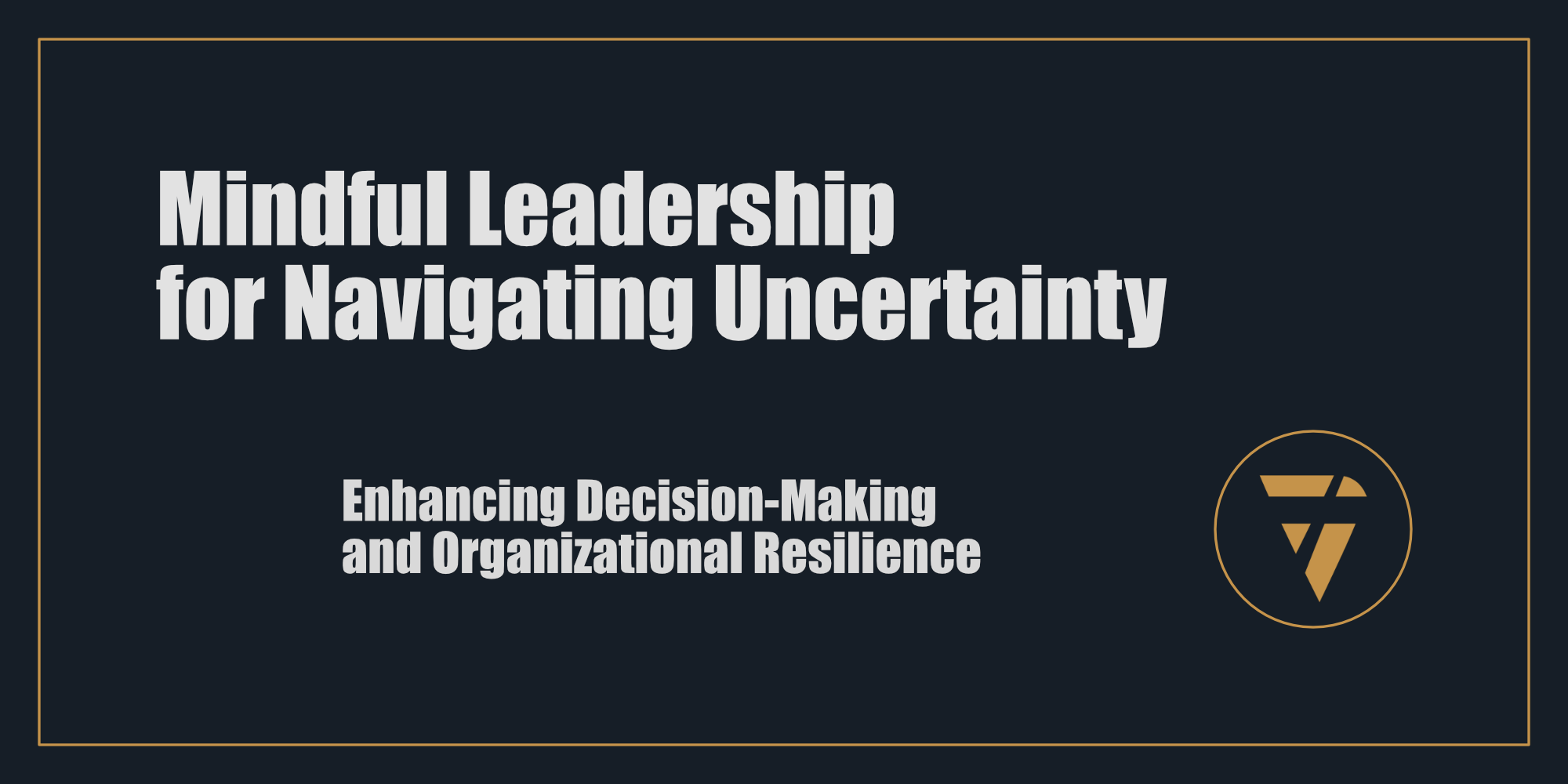Mindful Leadership for Navigating Uncertainty
Enhancing Decision-Making and Organizational Resilience

Uncertainty is the new normal. As global challenges grow more complex, the leaders who succeed aren’t the ones who act the quickest, but those who respond with the greatest wisdom. The secret? Mindfulness.
Why Mindfulness is the Leadership Superpower of Our Time
Global events such as economic instability, technological disruptions, and environmental crises have made the business landscape unpredictable. For leaders, this unpredictability demands more than just quick thinking, it requires clarity, emotional balance, and strategic foresight.
Mindfulness, once associated primarily with personal wellness, has emerged as a transformative tool for leaders navigating this uncertainty. Far from being a retreat into meditation rooms, mindfulness in leadership is about fully engaging with the present, making deliberate decisions, and fostering resilience in teams and organizations.
The Core of Mindful Leadership
Mindful leadership is not about detachment from challenges; it’s about deep engagement with them. This practice empowers leaders to:
- Pause and Reflect: Create space between a stimulus (e.g., a crisis) and response, enabling thoughtful decision-making.
- Navigate Complexity: Stay present and focused amidst chaos, avoiding knee-jerk reactions.
- Foster Emotional Intelligence: Cultivate awareness of one’s emotions and those of others to lead with empathy and clarity.
How Mindfulness Enhances Decision-Making
1. Improving Focus and Clarity
Uncertainty often triggers cognitive overload. Mindfulness practices like focused breathing or grounding techniques reduce mental noise, sharpening focus. Leaders can then:
- Prioritize tasks effectively.
- Make decisions based on data and intuition rather than fear.
2. Mitigating Cognitive Bias
Global challenges demand innovative thinking, but biases often cloud judgment. Mindfulness helps leaders recognize biases such as:
- Confirmation Bias: Seeking information that aligns with preconceptions.
- Recency Bias: Overemphasizing recent events.
By fostering awareness, leaders can approach problems with a clearer, more objective lens.
3. Strengthening Emotional Regulation
In uncertain times, leaders often face anxiety and stress. Mindful leaders develop the ability to observe these emotions without being consumed by them, maintaining composure and inspiring confidence in their teams.
Building Organizational Resilience Through Mindfulness
1. Creating a Calm and Adaptive Culture
Mindful leaders model behaviours that ripple through the organization:
- Calm under Pressure: Teams emulate a leader’s emotional state. A composed leader fosters a calm team.
- Adaptability: By embracing uncertainty as a constant, mindful leaders help organizations remain agile.
2. Enhancing Team Collaboration
Mindful communication, rooted in active listening and empathy, creates trust and psychological safety. These elements are critical for:
- Transparent problem-solving during crises.
- Cross-functional collaboration under pressure.
3. Long-Term Resilience
Resilience is not just about bouncing back; it’s about bouncing forward. Mindfulness helps organizations:
- Learn from setbacks.
- Identify opportunities within challenges.
The Proconsul Framework for Mindful Leadership
At Proconsul, we integrate mindfulness into leadership through actionable strategies:
1. Awareness Training
- Daily Practices: Start meetings with a two-minute mindfulness exercise to centre teams.
- Mindful Journaling: Encourage leaders to reflect on decisions and emotional states.
2. Strategic Decision-Making
- Pause Protocols: Introduce mandatory pause moments before critical decisions to reflect on biases and long-term impacts.
- Scenario Analysis: Use mindfulness to explore multiple outcomes without attachment to any single result.
3. Organizational Integration
- Workshops and Training: Equip teams with mindfulness tools to manage stress and improve collaboration.
- Mindful Metrics: Incorporate mindfulness outcomes, such as employee engagement and decision quality, into performance reviews.
How to Cultivate Mindfulness as a Leader
1. Start with Self-Awareness
Commit to daily mindfulness practices, such as:
- Meditation: Five to ten minutes of focused breathing.
- Body Scans: Regular check-ins with physical sensations to anchor yourself in the present.
2. Practice Mindful Listening
In team meetings:
- Listen without interrupting.
- Reflect back what you hear to ensure clarity and mutual understanding.
3. Build Space for Reflection
Set aside time in your schedule for:
- Reviewing past decisions and their outcomes.
- Exploring how personal biases might have influenced your actions.
Overcoming Challenges in Implementing Mindfulness
Skepticism About Mindfulness in Business:
Reframe mindfulness as a performance tool rather than a wellness practice.
Lack of Time:
Incorporate micro-practices into existing workflows, such as mindful breaths before presentations.
Actionable Takeaways for Leaders
- Adopt Micro-Mindfulness: Integrate brief mindfulness practices into daily routines.
- Lead by Example: Demonstrate mindfulness to inspire your team to do the same.
- Measure Impact: Track how mindfulness influences decision-making and team resilience.
Are your decisions shaped by clarity or chaos? How can mindfulness improve the way you lead through uncertainty? What steps will you take today to cultivate this transformative skill?
Mindful leadership isn’t just a practice—it’s a paradigm shift for thriving in an uncertain world. Subscribe for more actionable insights on how mindfulness can redefine your leadership journey. Let’s build resilience together.
This Substack is reader-supported. To receive new posts and support my work, consider becoming a free or paid subscriber.
This is what I’m working on. Tell me what you think, I enjoy the conversation! Subscribe and follow the work in real time.
Thanks!
B
Uncertainty demands more than quick decisions, it requires mindful ones. Leaders who embrace clarity, empathy, and focus inspire resilience in their teams and organizations. How are you leading through the chaos?
PS -





